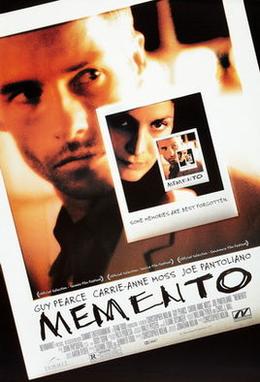Released: March 16, 2001
Rated: R
Studio: Newmarket Films
Staring: Guy Pearce, Carrie-Anne Moss, Joe
Pantoliano
Directed by: Christopher Nolan
Written by: Christopher Nolan
Personal Bias Alert: loves “The Prestige,” not
a fan of flashy storytelling that bogs down a movie
6.7 of 10
Reverse
chronology is a technique not unheard of, but not commonly used in film. Going into “Memento,” I was told that the
film was structured using this technique.
However, I quickly found that that wasn’t entirely true. A large portion of it is told backwards, but
there are also several scenes that clearly play out in a linear fashion. Now, considering that this wasn’t my first
foray in reverse chronology, I wasn’t too thrown by this. I had previously seen “Irreversible,” a film that
goes all in and tells its story entirely in reverse chronology (it goes all in
in many other ways, too, so I must give a big warning to those curious about
the film). Perhaps it was this
familiarity, or just my familiarity with writer/director Christopher Nolan’s
later work, that made “Memento” lack the punch it seems to have for other
people.
That
being said, I was very confused by the nuts and bolts of the story. I doubt anyone figures it out on their first
viewing, and considering I’ve only just watched the film for the first time,
I’m not 100% sure what happened, either.
I know that our main character, Leonard Shelby (Guy Pearce), is trying
to track down the man who assaulted and killed his wife. The complication is that Leonard has
anterograde amnesia, which prevents him from converting short-term memory into
long-term memory. Essentially, he can’t
remember anything after the attack on his wife.
There are two people currently helping him with his investigation, Teddy
(Joe Pantoliano) and Natalie (Carrie-Anne Moss).
The
nuts and bolts are intentionally hazy, and many facts that you thought you knew
are brought into question by the end.
Nolan makes well thought-out films, so I’m sure you could watch this
movie a few times and piece it all together, but I’m not sure it would really
add anything. “Memento” ends with some
very clear statements on its themes, and those are the real points of the
film. It’s much like my argument that
the question left hanging at the end of Nolan’s “Inception” doesn’t matter,
that the significant thing is that Cobb gave up his obsession and chose to live
his life. Here, Leonard makes a clear
choice as well.
Unfortunately,
where Nolan makes a cinematically elegant statement at the end of “Inception”
and, in what is in my opinion his best work, “The Prestige,” here he ends with
a bit of a clunk. The exposition-heavy
end scene isn’t masked by metaphor or strong visual storytelling. Instead, we get some straightforward dialogue
and some terribly on the nose narration.
This muted the sense of thrill that the ending should have evoked, and
to me is the clearest sign that, at this point in his career, Nolan was still
learning the finer points of his trade.
Nolan’s
decision to use the aforementioned chronology doesn’t make for a sleek film
either. It does get across how confusing
life is for Leonard, but it also makes it distractingly difficult to follow
what’s happening. Lots of time has to be
devoted to making the story semi-clear, like the repetition of the beginning
and end of scenes and the exposition-heavy, often stilted dialogue. The two main side characters, Teddy and
Natalie, suffer the most. It’s hard to
care much about them; at the beginning you are struggling to get a grasp on
them, and by the end you are wondering if (or how much) they are lying to
Leonard. It doesn’t help that Pantoliano
gives a one-note performance and that Natalie is terribly underwritten.
The
end effect is a narratively interesting, but otherwise stiff film. Twisty narratives are strong enough to carry
a film up to a point, but there needs to be more to make it feel like it really
mattered. Luckily, Nolan figured that out,
and he went on to make some truly excellent films.
Other Notes:
Ø Pearce
and Moss were both good in their roles, but they were there to serve the story,
not play real characters.
Ø Who
spotted the cast crossovers with “Battlestar Galactica” and “Sons of Anarchy”?
Ø If
Natalie recognizes that Leonard is driving her boyfriend’s car, why doesn’t she
look in it for the missing money? Or is she
just completely lying to Leonard about Dodd going after her for the money?
Ø So
many questions, and yet, I don’t really care if I know.


No comments:
Post a Comment